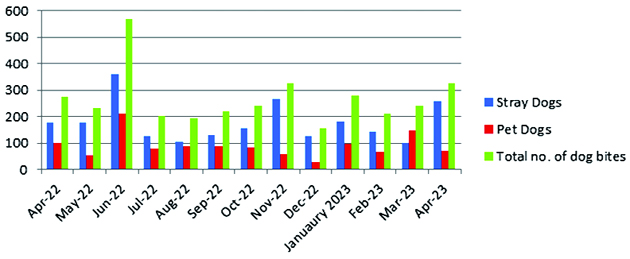Dr Divya Sharma,
Dr Sushil Kumar Sharma
Theme for World Animal day 2023 is “RAISING THE STATUS OF ANIMALS TO IMPROVE WELFARE STANDARDS AROUND THE GLOBE”. To achieve the goal for welfare of street dogs, Jammu Municipal Corporation is laying down its serious efforts. Dogs serve a variety of purposes in the community and should not be viewed as a threat but rather as an important component of daily life. They are entitled to first aid and shelter when in need, just like the human population. As Indian cities have grown, stray dogs have emerged as one of the country’s most significant public management issues and a major source of public anxiety. City environments and human health are supposed to be negatively impacted by stray dogs in numerous ways. With almost 35 million stray animals, India is the country with the most strays worldwide. India also accounts for more than a third of all rabies-related deaths.
 The issue of increasing stray dog population has numerous reasons like absence of an effective Animal Birth Control/ Anti rabies vaccination Programme, abandoning of pet animals by owners for various reasons etc. Stray dogs in numerous ways negatively impact city environments and human health. Stray dogs contribute to traffic accidents, faeces waste, noise pollution and human dog conflicts. Thousands of stray dogs can be seen wandering in the streets at night. When stray dogs run into the road, it can result in a collision that could hurt both the dog and other drivers. Additionally, stray dogs also pose a greater risk to human health and lives. Stray dogs have the potential to spread the deadly disease rabies. According to the World Health Organization (WHO), there are more than 200 million stray dogs in the globe, and 55,000 people die from rabies each year.
The issue of increasing stray dog population has numerous reasons like absence of an effective Animal Birth Control/ Anti rabies vaccination Programme, abandoning of pet animals by owners for various reasons etc. Stray dogs in numerous ways negatively impact city environments and human health. Stray dogs contribute to traffic accidents, faeces waste, noise pollution and human dog conflicts. Thousands of stray dogs can be seen wandering in the streets at night. When stray dogs run into the road, it can result in a collision that could hurt both the dog and other drivers. Additionally, stray dogs also pose a greater risk to human health and lives. Stray dogs have the potential to spread the deadly disease rabies. According to the World Health Organization (WHO), there are more than 200 million stray dogs in the globe, and 55,000 people die from rabies each year.
WORLD ANIMAL DAY
To manage the population of our community dogs living on the streets of Jammu, Municipal Corporation Jammu have adopted ABC program suggested by the WHO. The only scientific method to humanely reduce street dog population is by spaying, neuter and final releasing back of dogs to their territories after they are fit to release with a permanent ear notch as identification mark on right ear. Jammu city has a stray dog population of almost (43000 ± 10%). In an attempt to effectively and sustainably control the stray dog population, to reduce the incidence of dog bites and to curb the spread of rabies in Jammu city as per the Animal birth control (ABC) dog rules (2023) and guidelines of Animal Welfare Board Of India, Jammu Municipal Corporation has entered into an agreement with an implementing Agency M/s FRIENDICOES-SECA (Regd.) to carry out the Animal Birth Control and Anti Rabies Vaccination programme in all the 75 wards of JMC. The said agency has started the work w.e.f April 2021 for effective management of street dog population and no area within JMC limits will be left uncovered under the ABC/ARV programme as ward wise catching of stray dogs is being done. The said programme is being carried out as per the standards and protocols prescribed by the Animal Welfare Board of India.
During the year 2021-22, 2022-23, 6462 no & 8292 no. of stray dogs have been sterilized, vaccinated and released back to the same locality from where they were caught as per the guidelines of ABC (Dog) Rules, 2023. A Grand total of 17,562 no. Of ABC/ ARV (Sterilization & vaccination) have been done by JMC till 31st July 2023.
Due to the effective implementation of ABC/ARV programme within JMC limits, the dog bite cases have been drastically decreased from 5184 in the year 2021-22 to 2057 in 2022-23 as per the information collected from the Health & Medical Education Department.
To completely curb and solve these stray dog-related issues a community approach involving general public, animal welfare organizations, resident welfare associations, animal welfare volunteers and government organizations need to collaborate. Parallely strict rules and regulations in order to prohibit the improper disposal of solid waste and casual feeding of dogs, promote formal ownership that requires dogs to be adopted and directly cared for to eliminate canine homelessness altogether need to be implemented in letter and spirit. Without these improvements, the Rules could create more problems at the local level while failing to address the root cause of the problem.
(The authors are Veterinary Officer
JMC and MVO, JMC)


